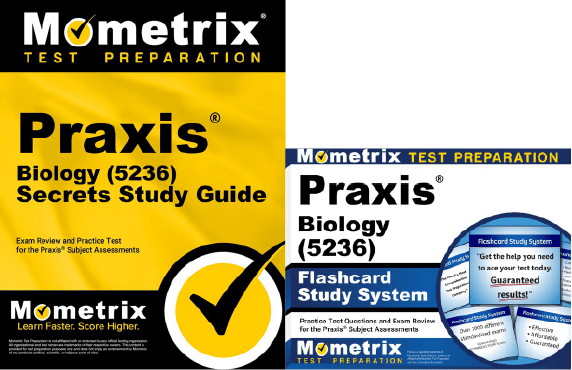If you need help studying for the Praxis® Biology test or just want some more information about what the test is like, you’ve come to the right place!
Click below to take a free Praxis Biology practice test!
What’s on the Exam?
First, let’s talk about the questions on the Praxis Biology test. There are 150 selected-response questions in total.
Selected-response questions can appear in several different forms:
- Single-selection multiple-choice
- Selecting ALL correct answers from a list of choices
- Selecting the correct answer from a drop-down menu
- Clicking parts of a graphic such as a map or a chart
- Dragging and dropping answers into a targeted area on the screen
The time limit for the test is 2.5 hours. There aren’t any scheduled breaks, but you’re free to take restroom breaks as needed!
Let’s take a closer look at the different sections of the test:
1. Nature and Impact of Science and Engineering
19 questions
- The nature of scientific knowledge
- Experimental design and data collection
- Lab procedures
- Engineering design
- The interdependence of technology, science, and engineering
- The impact of science, human activity, and technology on society and the environment
- Science applications in public health, agriculture and medicine
2. Cell Biology: Cell Structure and Function
33 questions
- Chemical properties and structures of molecules
- The dependency of biological processes on chemical principles
- Enzyme functions and structure
- Major biochemical pathways
- Energy flow
- Living vs. non-living
- Cell and organelle structure and function
- The maintenance of a cell’s internal environment
- A cell’s response to external signals
- Eukaryotic cell division
- The cell cycle
3. Genetics and Evolution
39 questions
- Nucleic acid structure
- Chromosome structure
- Genetic information transfer process
- The nature of mutations
- Mendelian genetics
- Non-Mendelian inheritance
- Lab techniques
- Sources of genetic variation
- Evolution mechanisms
- Scientific explanations for Earth’s origin
- Models of evolution
- Factors of species extinction
4. Diversity of Life and Organismal Biology
30 questions
- Biological classifications of organisms
- Characteristics of viruses, eubacteria, fungi, plants, and animals
- Cell differentiation
- Cell specialization
- Major human organ systems
- Homeostasis
- Reproduction, development, and growth
- Behavior
- The processes of plants obtaining, transporting, and storing materials
5. Ecology: Organisms and Environments
29 questions
- The biosphere’s hierarchical structure
- Relationships between species
- Relationships among population growth, demographics, and reproductive strategies
- Biotic and abiotic components and their influence on community structure
- Human impacts on ecosystems
- Ecological succession
- Biomes
- Energy flow within biomes
- Biogeochemical cycles
How to Register
To register for the test, you’ll need to create an account on the ETS website. Once your account has been created, you can submit your application to take the test.
Praxis Scores
The Praxis Biology test is scored using a scaled scoring method. Here’s how it works:
For every question you answer correctly, you get one point added to your raw score. At the end of the test, your final raw score will be converted to a scaled score. This scaled score will range somewhere between 100 and 200.
The reason your raw score is converted to a scaled score is because everyone that takes the test is given a slightly different set of questions. Since everyone has a different arrangement of questions, and because some questions are harder than others, converting your raw score to a scaled score ensures a more even playing field.
FAQs
How many questions are on the Praxis Biology test?
The test contains 150 questions.
What is the time limit for the Praxis Biology test?
The test is timed at 2.5 hours.
What is the passing score for the Praxis Biology test?
The passing score varies from state to state.
How much does the Praxis Biology test cost?
The testing fee is $130.
Praxis is a registered trademark of Educational Testing Service, which is not affiliated with Mometrix Test Preparation and does not endorse this page.



 Praxis Study Guide
Praxis Study Guide Praxis Flashcards
Praxis Flashcards